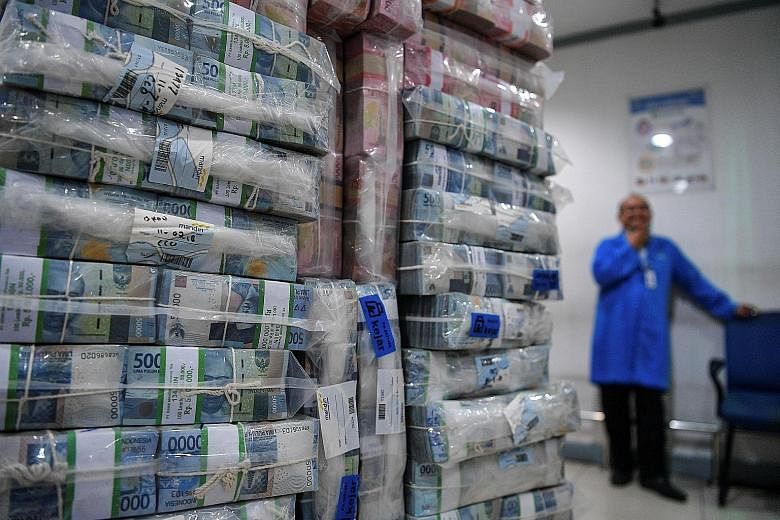The sharp drop in the rupiah, caused by a widening current account deficit and further weakened by US-China trade tensions, has prompted Indonesia to mull over measures to stem a further slide.
The current account deficit in the second quarter hit US$8 billion (S$10.9 billion) - an amount equal to 3 per cent of gross domestic product and the highest in nearly four years.
One of the measures under consideration is to offer tax incentives to businesses for converting their US dollar holdings into rupiah, said a government source.
Another is to relax taxes for bond investors so as to spur financial markets, the source added.
A big headache for Indonesia is export-oriented companies which hold their proceeds in US dollars rather than the rupiah. The government is now considering whether lowering the corporate income tax may incentivise the firms to convert to the rupiah. Indonesia's standard corporate tax rate is 25 per cent.
Currently, for bond investors, income from their holdings is taxed at 15 per cent if they are Indonesians and 20 per cent if they are foreigners. Other countries, including Singapore, do not levy taxes on bond investment income.
The Finance Ministry's fiscal policy head, Mr Suahasil Nazara, said his office has been looking into the possibility of revising down the tax rates for bond investments for some time. No decision has yet been made as a study is ongoing.
"We have been gauging the pros and cons, and comparing tax rates for bond investment with those levied on other investment instruments such as bank deposits," he said in reply to The Straits Times at a media briefing yesterday.
"We understand that we should have a simpler tax system. We try to go in that direction," he added.
Finance Minister Sri Mulyani Indrawati told reporters at the same briefing that Indonesia is following the global economic dynamic closely, keeping communication channels with the private sector open and ready to make a further response when the need arises.
Separately, Coordinating Minister for Maritime Affairs Luhut Pandjaitan, who is on the government panel tasked to deal with global economic uncertainties, told The Straits Times that Indonesia must tap the possibility of Chinese manufacturers affected by the US trade dispute relocating overseas.
This week, Alibaba chairman Jack Ma sounded the warning more than once that China-US trade tensions could drag on for 20 years. On Tuesday, Beijing said it would impose tariffs on US$60 billion worth of US goods in retaliation for the new 10 per cent tariff that Washington on Monday announced on US$200 billion worth of Chinese goods.
The rupiah has fallen about 9 per cent against the US dollar this year, making it the second-worst performer in Asia, after India's rupee.
Though politically risky, hiking fuel prices remains a tempting option to address the widening current account gap. However, there is a debate about whether higher fuel prices will actually reduce demand.
Indonesia consumes 1.6 million barrels of crude oil a day, half of which is imported. Soon after Mr Joko Widodo became president in 2014, he raised fuel prices and capped the diesel subsidy. Until then, fuel subsidies cost the country billions of dollars annually.

